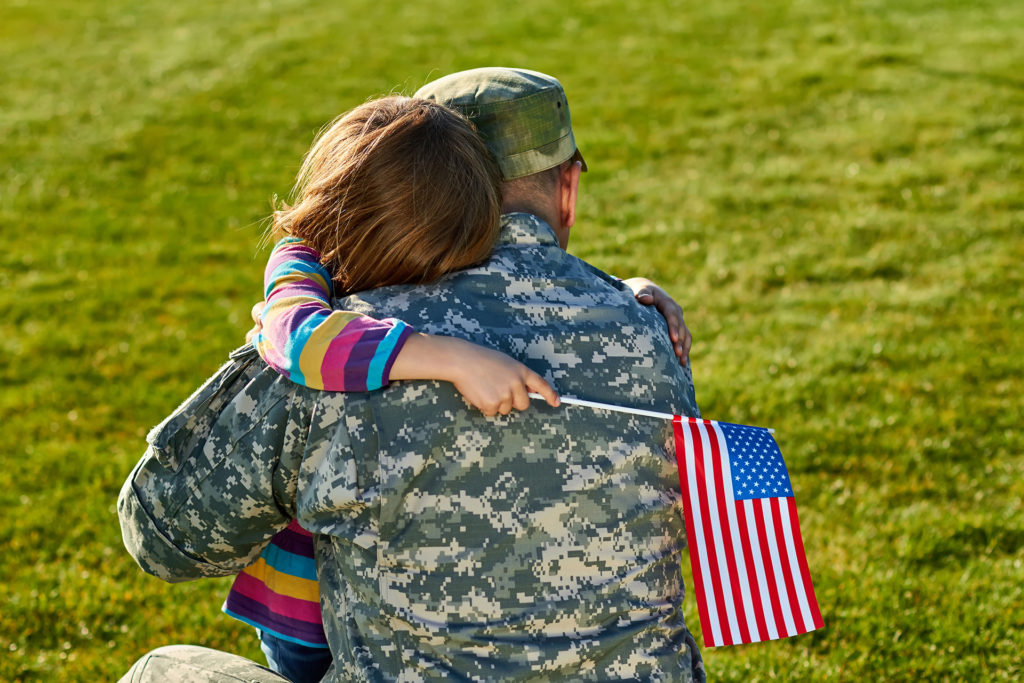
Deployments can be difficult for the entire military family unit. It’s stressful anticipating the deployment day as preparations are made during a “known” deployment. When troops rapidly and suddenly deploy without much warning, the effects can be traumatic and hard for children to bear. Children need processing time to understand what is happening and what the new normal in the family unit will be. When they are stripped of that processing time, it can be emotionally taxing for them. Luckily, there are ways you can help ease the pain they feel and comfort them.
1-Read together-Books can be a great way of helping children understand the deployment and separation. A few that specifically deal with the topic of deployment are; One of Our Pieces is Missing, When Dad Deploys, When Mom Deploys, Daddy Left with Mr. Army: A Child’s View of Military Deployment, and The Adventures of a Military Brat series. Many of these are written by military spouses and veterans, who have been through deployments with their own children and know just what might help them through this situation. Sesame Street has created a series devoted to the unique challenges that military families face. In this video, Elmo tackles the challenge of his dad leaving on deployment.
2-Recreation-Having a physical outlet can help children with any negative emotions they are feeling. Exercise is super beneficial for children as they navigate their feelings. Think about how much better adults feel after a nice workout or sweat session at the gym. Children reap the same benefits and will be better equipped and calmer during such an emotional time. Organizational such as Tiny Troops Soccer are giving military kids this outlet at bases across the United States, including Fort Bragg.
3-Create Care Packages-Many times with rapid deployments, you aren’t always given an address right away. In the meantime, you can start a care package box with your children. This will allow them to contribute to the box as they feel a need to write a letter, draw a picture, etc. Put the box in a place, such as near a deployment wall, where they can easily contribute items to it.
4-Tell Daddy or Mommy Jar-One thing children miss the most during deployments is that everyday interaction with their parent. Each day, ask your child or children what they would like to tell daddy or mommy. For older children, have them write it down. For younger children, write it down on a strip of paper exactly as they say it, put the date on it, fold it up, and place it into the jar. The next time you can speak to the service member, your child will have all the things they have wanted to share with daddy or mommy. Then, you can empty the jar and start over for the next time.
5-Give Extra Love-Children need extra love during times of distress. Hold them a little longer and hug them extra during the initial phase of deployments. This lets them know that they are not alone to deal with their emotions. Children go through a temporary grieving process when they say goodbye to a deployed parent. Understand that children will have many different emotions during the process and give them as much compassion as possible. For extra help, the Cohen Veterans Network offers no-cost counseling services for active-duty military families and veterans.
6-Deployment Wall-Deployment Walls can offer a child a nice visual and offer comfort when they miss their deployed parent. You will need two clocks, one for your time zone and one for the time zone that the deployed parent is located in. Next, you will need a world map to show where your family is located and where mommy or daddy is located. Lastly, you can add in pictures of your family together, a countdown calendar, United States Flag, and anything else that resembles your family and the deployed parent. You can also add pillows and a comfortable place for children to sit to allow them a place to feel close to mom or dad. A deployment wall gives children a great visual reference and helps them understand as well as process the deployment.
7-Seek Support at Your Child’s School-You are your child’s advocate. Many Child Care Centers and Public School Systems offer support and resources for military children. Talk with your child’s teacher and explain what is going on in case they notice different behaviors in your child. Also, ask for resources and referrals if needed.
There are many ways to help children through deployments, in addition to the strategies mentioned above. The important thing when it comes to deployments and children is the processing time, which may look different for each child. With the appropriate support systems and activities, children can learn resilience and coping skills.
